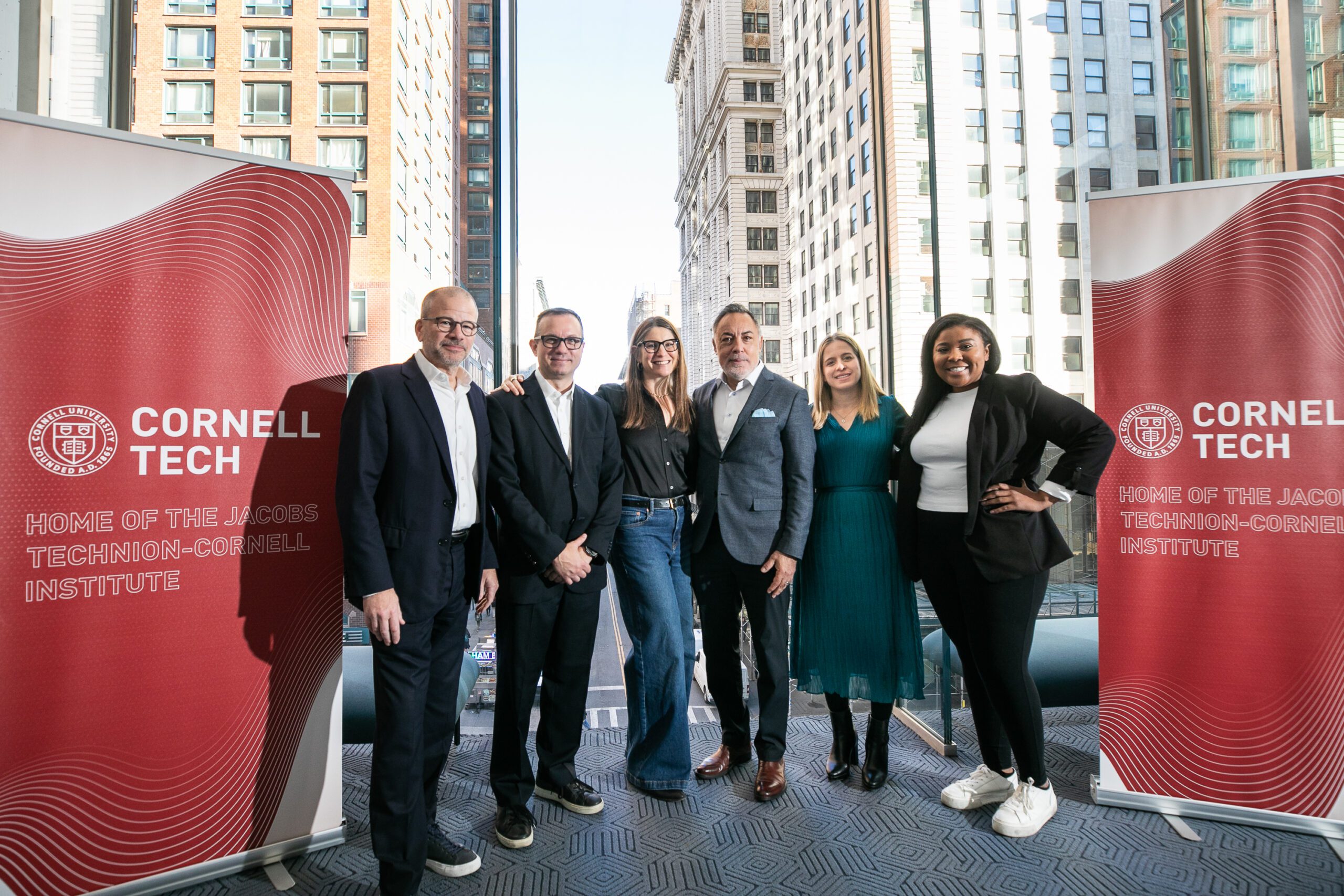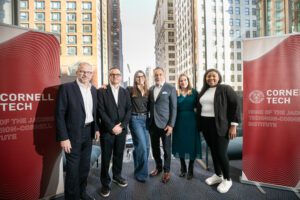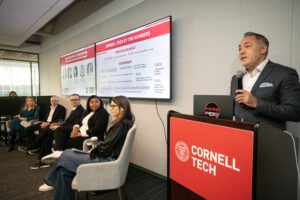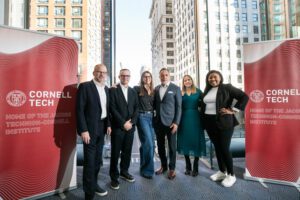on Nov 14, 2024
New Report Quantifies Cornell Tech’s Role in Attracting Talent to New York City and Growing the City’s Tech Sector

New Report Quantifies Cornell Tech’s Role in Attracting Talent to New York City and Growing the City’s Tech Sector
This press release was originally issued by Cornell Tech.
Since its founding in 2012, Cornell Tech has played a crucial role in developing New York City’s tech talent, entrepreneurship, job creation, and fiscal prosperity. From launching more than 100 startups and educating thousands of new tech leaders to operating an 850,000-square-foot campus while planning future expansion, the energy coming out of the regional tech hub is undeniable. But what is its overall economic impact? A new analysis from economic development firm HR&A puts it into numbers – and they are massive.
In fiscal year 2022-2023, Cornell Tech, its alumni, and its startups based in New York City achieved $768 million in total economic impact and supported 2,800 jobs. And by 2030, Cornell Tech’s alumni and startups based in New York City are projected to generate $1.5 billion in annual economic impact while supporting 7,000 jobs, living up to its reputation as the single most effective economic development project undertaken by city government in recent decades.
“New York City has been a consistent draw for ambitious and intelligent people from around the world. Cornell Tech has created a novel academic and entrepreneurial environment that brings new tech talent to the city who go on to become industry leaders and builders who are driving our city’s workforce and technology industry,” said Greg Morrisett, the Jack and Rilla Neafsey Dean and Vice Provost of Cornell Tech. “This report not only highlights the significant contributions that Cornell Tech has made to our local economy, but also emphasizes how our growing alumni network will lead innovation in emerging technology and artificial intelligence for years to come.”
HR&A’s analysis quantified the projected spending and economic impact generated by Cornell Tech, its alumni, and the startups they create, finding that “the campus operates educational and entrepreneurial programs that attract world-class talent who remain in New York City after graduation to work in high-paying industries while creating thousands of new jobs for tech workers that contribute to the city’s tech ecosystem.”
Cornell Tech’s startup programs have launched more than 115 companies. These startups have generated a collective valuation of more than $700 million while creating more than 500 new jobs in New York City, boosting the local economy and tech community. Some of the most notable startups include baby sleep monitor Nanit, real estate construction intelligence platform OnsiteIQ, and infectious disease diagnostic Biota. As of 2023, companies founded at Cornell Tech in the health sector generated $97 million for the city, making up almost 50% of the total economic output from Cornell Tech’s startups and helping New York City to surpass Silicon Valley as the leader in digital health startups. The share of Cornell Tech companies founded by women (32%) and the share of funds raised that go to women-founded companies (23.5%) outperforms national and city averages.
In addition to spending activity, the report outlines the revenue and construction jobs generated by the creation of the campus itself, with Cornell Tech’s construction to date and upcoming construction expected to generate $1.1 billion in labor income and $2.4 billion in economic output by 2030.
Cornell Tech was founded in 2012 when Cornell University and the Technion–Israel Institute of Technology were selected by Mayor Michael R. Bloomberg to establish a campus after competing in the Applied Sciences NYC Competition, which sought to increase New York City’s capacity for applied sciences and dramatically transform the city’s economy.
Collaborating closely with the New York City Economic Development Corporation (NYCEDC) since its founding, Cornell Tech was first located in Google’s New York City offices on Eighth Avenue before moving to its state-of-the-art Roosevelt Island campus in 2017 and has retained its longstanding productive partnerships with both the city and NYCEDC in the years since.
“Cornell Tech has been a transformative force in growing New York City’s economy by integrating academia with industry and attracting international talent while fostering groundbreaking innovation, generating thousands of high-quality jobs, and contributing millions in economic output,” said New York City Economic Development Corporation (NYCEDC) President and CEO Andrew Kimball. “NYCEDC and the City of New York recognized early on that the creation of a world-class academic institution would be a cornerstone investment in our city’s future and would further catalyze the growth of the tech ecosystem. We look forward to building on this successful partnership to continue to drive long-term economic benefits and job creation through our shared goals and initiatives.”
The innovation ecosystem created by Cornell Tech has had the effect of not only drawing future tech leaders to New York City but also keeping them here. Carmem Leticia da Maia Silva, who came from Brazil to earn a master’s degree in Law, Technology, and Entrepreneurship at Cornell Tech, is just one of those success stories. Now, she negotiates major IT agreements, provides critical legal guidance, and ensures proper alignment with global corporate policies at McKinsey & Company – one of the world’s most esteemed and influential management consulting firms.
“I’ve always been interested in the interplay between law and tech, how statutes and regulations anticipate and respond to innovation. What drew me to Cornell Tech was the opportunity to closely collaborate with executives and decision makers from major companies,” said da Maia Silva. “At Cornell Tech, I was able to work side-by-side with entrepreneurs driving the tech industry forward and apply those learnings to my study of real-world legal issues.”
Da Maia Silva’s New York City success story is one of many connected to Cornell Tech. Her peers include Aish Ravindran, who came to New York City for the Johnson Cornell Tech MBA program from Los Angeles and became a product manager for New York-based Uber Health following graduation. Anirban Poddar, who came to Cornell Tech from India for a master’s in engineering, now works as a product manager at Amazon. Another is Arvin Khodayari, who brought his passion for judicial studies from Canada to pursue his master’s of law from Cornell Tech and now works in New York City as an associate at Ropes & Gray LLP. In all, 75% of the Cornell Tech students who move to New York City from elsewhere stay in the region. These alumni alone generated $390 million in annual economic output in fiscal year 2022-2023, which is projected to grow to $956 million by 2030.
“As a graduate student, it quickly became clear that staying in New York City after graduation was a must,” says da Maia Silva. “The tech and legal networks here are unrivaled when it comes to having an impact on a global scale – and Cornell Tech is at the center of it.”
The full report can be accessed here: https://tech.cornell.edu/impact/cornell-tech-impact-study/.








